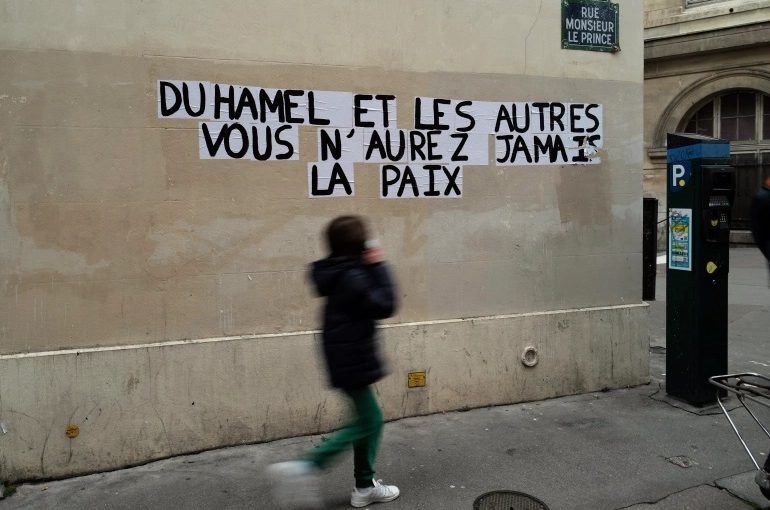Matteo Zuppi, discreet diplomat and progressive cardinal
Victims of incest in France come forward in the thousands – Watch

A sign on a Parisian wall reads 'Duhamel, and the others, you will never be in peace', referring to the prominent French political expert Olivier Duhamel, who is accused of raping his stepson [Francois Mori/AP]
Decades of silence come to an end as France comes to term with a pervasive culture of incest that has affected one in ten people.
The book ‘La Familia grande’ in which the author, Camille Kouchner, accuses her stepfather of sexually abusing her twin brother when he was 14, has taken France by storm.
The revelations have resulted in thousands of people coming forward. The hashtag #MeTooIncest has been trending on Twitter for several days.
What made the revelations in the book more scandalous is that the alleged perpetrator, Olivier Duhamel, was an establishment political and cultural figure who rubbed shoulders with the French elite.
Kouchner details the culture of secrecy in her family, and that leading political figures around Duhamel knew about the abuse but turned a blind eye to it.
The hashtag was started by an organisation battling sexual violence against minors known as NousToutes who described the deluge of people coming forward as a breakthrough moment in their struggle to bring attention to the victims and perpetrators.
“We have witnessed an unprecedented wave of testimonies from people who have suffered incest and sexual violence,” said a petition linked to the organisation.
The hashtag #MeTooIncest has been tweeted more than 80,000 times with other activists calling it a watershed moment which could end decades of impunity for perpetrators.
La violence n’est jamais une forme ni une preuve d’amour.
Les survivant.e.s ne sont jamais coupables.
A tous qui avez le courage de témoigner #MeTooGay comme celles & ceux du #MetooInceste & #MeToo .
Nous vous croyons.
Nous vous soutenons.
Ensemble faisons trembler les bourreaux— Alexandre Kouchner (@AlexKouchner) January 24, 2021
French Prime Minister Jean Castex, and more widely the President Emmanuel Macron, have been criticised for being slow to tackle or acknowledge sexual violence towards children.
“Not a word of empathy for victims,” said one activist regarding the government’s response to the latest revelations.
According to a survey carried out in France, 96 percent of cases of incest are perpetrated by men.
The survey found that 13 percent of men in the country and 18 percent of women had been victims of physical and sexual abuse including incest before the age of 18.
In another survey carried out by the organisation “Face à inceste” (Facing Incest) it was revealed that more than 6.7 million French people have been victims of it in the country.
Ces témoignages, ces paroles, ces cris, plus personne ne peut les ignorer. Contre les violences sexuelles faites à nos enfants, c’est aujourd’hui à nous d’agir : https://t.co/QcCSo4o528
— Emmanuel Macron (@EmmanuelMacron) January 23, 2021
In France, incest has been a long-held taboo with victims often not being listened to, says the organisation Face à inceste.
It wasn’t until 2016 that a law was introduced specifically mentioning it as a criminal activity. Now campaigners want to go a step further.
As it stands, a child who goes to authorities alleging incest against an individual must prove that they did not give consent to the abuse.
The president of Face à inceste, Isabelle Aubry, has denounced the law as it stands as “simply unbearable”, and that it was reprehensible to ask children if they consented to “having sex with a family member.”
Aubry has added that while they have been fighting the current ‘legal aberration’ for 20 years, the state has been sending the symbolic message, “children must protect themselves, they cannot rely on the law.”
The organisation is now leading a campaign to have the law changed and the petition has already been signed by thousands.
As pressure on the government has grown, it has been forced to consider legislation that would no longer allow perpetrators of abuse to argue that the child had consented to incest.
Campaigners around this law want to simplify it, they argue that legal technicalities have too often allowed victims unable to seek justice.
As it stands, in order to prove charges of rape or sexual assault, including towards a child, the victim must prove that violence, surprise or coercion were used.
Campaigners have said that the current qualification is unnecessary, arguing that “any non-incestuous sexual act committed on a minor under the age of 15 must be qualified as a paedophile offence.”
Repeated attempts to change the law in the past have failed. Now, with a groundswell of support behind them, victims and campaigners think this could be their moment to transform French society and lift the veil on a culture of pervasive secrecy that has shrouded incest in the country.
Breaking the silence on incest: How France is facing up to the unspeakable
France is reeling from claims and revelations of incest. It began with a book by the sister of an alleged victim – her own twin brother – abused sexually throughout his teens by his stepfather, political scientist Olivier Duhamel. Camille Kouchner’s book “La familia grande” has blown the lid off a massive social problem. What happened to her brother is classified as incest in France. In other countries it would be called child sex abuse – all the more damaging because it is perpetrated by a person in loco parentis.
There has been a huge reaction, with other people coming forward to state that they too have been sexually abused. One in ten people in France have experienced some degree of sexual abuse within their family set-up. The group Face à l’Inceste (Facing Up To Incest) says its research also revealed that most often the victim is a girl, most often an uncle is the abuser. A French hashtag #MeTooInceste was quickly coined and people started sharing their own personal shocking stories on social media.
Our guests share their knowledge about this issue and possible solutions.













Leave a Reply
Be the First to Comment!
You must be logged in to post a comment.
You must be logged in to post a comment.